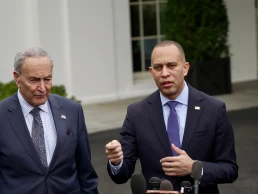“The global energy crisis has been a giant cash grab for fossil fuel firms,” said one campaigner. “And instead of investing their record profits in clean energy, these companies are doubling down on oil, gas, and shareholder payouts.”
by Julia Conley, Common Dreams
The year 2023 was marked by weather events that made it increasingly clear that the Earth has entered what United Nations Secretary General António Guterres called the “era of global boiling,” with wildfires and prolonged heatwaves impacting millions of people and scientists confirming their suffering was the direct result of fossil fuel extraction and planetary heating.
But for the world’s five largest oil giants, the year marked record profits and the approval of several major new fossil fuel projects, allowing the companies to lavish their shareholders with payouts that are expected to exceed $100 billion—signaling that executives have little anxiety that demand for their products will fall, said one economist.

The companies—BP, Shell, Chevron,ExxonMobil, and TotalEnergies—spent $104 billion on shareholder payouts in 2022, and are expected to reward investors with even more in buybacks and dividends for 2023, The Guardian reported.
Shell announced plans in November to pay investors at least $23 billion—more than six times the amount it planned to spend on renewable energy projects—while BP promised shareholders a 10% raise in dividends and Chevron could exceed the $75 billion stock buyback it announced early last year.
Alice Harrison, a campaigner for Global Witness, noted that fossil fuel shareholders will be enjoying their paydays as households across Europe struggle with fuel poverty and the world faces the rising threat of climate disasters brought on by the industry.
“The global energy crisis has been a giant cash grab for fossil fuel firms,” Harrison told The Guardian. “And instead of investing their record profits in clean energy, these companies are doubling down on oil, gas, and shareholder payouts. Yet again millions of families won’t be able to afford to heat their homes this winter, and countries around the world will continue to suffer the extreme weather events of climate collapse. This is the fossil fuel economy, and it’s rigged in favor of the rich.”
In 2023 campaigners intensified their demands for accountability from the oil, gas, and coal industries, and as of last month had successfully pressured more than 1,600 universities, pension funds, and other institutions to divest from fossil fuels. In the U.S., provisions in the Inflation Reduction Act, which has been touted as the “largest investment in climate and energy in American history,” went into effect.
But Dieter Helm, a professor of economic policy at the University of Oxford, The Guardian that if the industry were truly fearful of policymakers phasing out fossil fuel extraction and expediting a transition to renewable sources, they would be spending far less on new projects and shareholder payouts.
“For this to be the case you would have to believe that the energy transition is happening, and that demand for fossil fuels is going to fall,” Helm told The Guardian.
In 2023, U.S. President Joe Biden infuriated climate campaigners by approving the Willow oil drilling project in Alaska, which could lead to roughly 280 million metric tons of heat-trapping carbon dioxide emissions. His administration also included in a debt limit deal language that would expedite the approval of the Mountain Valley Pipeline, which could emit the equivalent of more than 89 million metric tons of carbon dioxide, while the U.K. government greenlit a massive oil drilling field in the North Sea and French company TotalEnergies continued to construct the 900-mile-long East African Crude Oil Pipeline, which would transport up to 230,000 barrels of crude oil per day.
“These companies are investing a huge amount in new projects, and they’re handing out bigger dividends because they are confident that they’re going to make big returns,” Helm said. “And when we look at the state of our current climate progress, who’s to say they’re wrong?”
Climate campaigner Vanessa Nakate pointed out that the shareholder paydays are expected following a deal on a loss and damage fund at the 28th annual United Nations Climate Change Conference, aimed at helping developing countries to fight the climate emergency. That fund was hailed as “historic” and included a commitment of $700 million from wealthy countries—a sum that is expected to be dwarfed by fossil fuel investors’ profits.
“They have picked people’s pockets, fueled inflation and pollution, and deepened poverty,” U.K. House of Lords member and Tax Justice Network co-founder Prem Sikka said of the oil giants. “Governments do nothing to end their monopolistic control. Need to break-up this cartel.”
Recent Posts
As Trump Attacks the Republic, the Cowardly Democratic Party Still Won’t Fight to Win
February 2, 2026
Take Action Now With few exceptions, the Democratic Party apparatus is coasting, playing “it safe,” and expecting that the Trumpsters will deliver…
ACURA Symposium: Mr. President, Renew New START for the Sake of Peace.
February 2, 2026
Take Action Now While Russian President Vladimir Putin has expressed his desire to extend the treaty, it is possible that Trump is being influenced…
Militarized Immigration Enforcement Incompatible With Democracy
February 1, 2026
Take Action NowICE’s targeting of virtually anyone who is not white and English-speaking — including, ironically, Native Americans — exposes this…
Trump’s Back-and-Forth Threats on Iran Are Psychological Warfare
January 31, 2026
Take Action NowAs Trump threatens Iran yet again, Congress continues to abdicate its responsibility to rein in war.By Hanieh Jodat, Truthout As…




